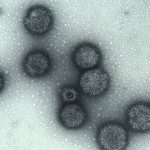Lien vers Pubmed [PMID] – 21324381
Infect. Genet. Evol. 2011 Apr;11(3):654-62
Escherichia coli is a versatile species encompassing both commensals of the digestive tracts of many vertebrates, including humans, and pathogenic strains causing various intra- and extraintestinal infections. Despite extensive gene flow between strains, the E. coli species has a globally clonal population structure, consisting of distinct phylogenetic groups. Little is known about the relationships between phylogenetic groups and host specificity. We therefore used multilocus sequence typing (MLST) to investigate phylogenetic relationships and evaluated the virulence gene content of 35 E. coli strains representative of the diverse diseases encountered in domestic animals. We compared these strains with a panel of 101 human pathogenic and 98 non-human and human commensal strains representative of the phylogenetic and pathovar diversity of this species. A global factorial analysis of correspondence indicated that extraintestinal infections were caused mostly by phylogenetic group B2 strains, whereas intraintestinal infections were caused mostly by phylogenetic group A/B1/E strains, with strains responsible from extraintestinal or intraintestinal infections having specific virulence factors. It was not possible to distinguish between strains of human and animal origin. A detailed phylogenetic analysis of the MLST data showed that numerous pathogenic animal and human strains are very closely related, and had a number of virulence genes in common. However, a set of specific adhesins was identified in animal non-B2 group strains of all pathotypes. In conclusion, human and animal pathogenic strains share common genetic backgrounds, but non-B2 strains of different origins seem to have different sets of adhesins that could be involved in host specificity.

